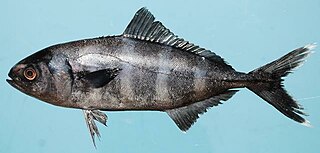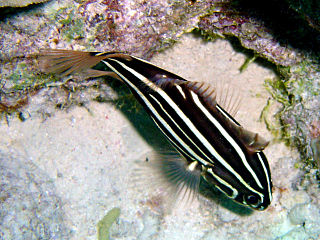
Gouramis, or gouramies, are a group of freshwater anabantiform fish that comprise the family Osphronemidae. The fish are native to Asia—from the Indian Subcontinent to Southeast Asia and northeasterly towards Korea. The name "gourami", of Indonesian origin, is also used for fish of the families Helostomatidae and Anabantidae.

Anthias are members of the family Serranidae and make up the subfamily Anthiinae. The name Anthiidae is preoccupied by a subfamily of ground beetles in the family Carabidae created by Bonelli in 1813 and this grouping should be called the Anthiadinae. However, both the 5th Edition of Fishes of the World and Fishbase give the Serranid subfamily as "Anthiinae".

Congiopodidae, commonly known as pigfishes, horsefishes and racehorses, is a family of ray-finned fish classified with in the order Scorpaeniformes. These fishes are native to the Southern Hemisphere.

Trichogaster is a genus of gouramis native to South Asia from Pakistan to Myanmar. It is the only genus in the monotypic subfamily Trichogastrinae as set out in the 5th Edition of Fishes of the World, although that book states that there are two genera, the other being Colisa which is treated as a synonym of Trichogaster by Fishbase and the Catalog of Fishes. Fishbase also places the genus in the Luciocephalinae. Species of this genus are very popular in the aquarium trade.

Pentacerotidae or armourheads are a small family of fishes in the order Perciformes. They are native to the Indian Ocean, western and central Pacific, and southwestern Atlantic. They are generally found at rocky reefs below normal scuba diving depths, although several species occur in low densities at shallower depths.

Caranginae is a subfamily of ray-finned fish from the family Carangidae which consists of twenty genera and 103 species.
Pteroini is a tribe of marine ray-finned fishes, one of two tribes in the subfamily Scorpaeninae. This tribe includes the lionfishes, sawcheek scorpionfishes and turkeyfishes. The taxonomy of the scorpionfishes is in some flux; the 5th Edition of Fishes of the World treats this taxa as a tribe within the subfamily Scorpaeninae of the family Scorpaenidae within the order Scorpaeniformes, while other authorities treat it as a subfamily within a reduced family Scorpaenidae within the suborder Scorpaenoidei, or the superfamily Scorpaenoidea within the order Perciformes.

The Scorpidinae, commonly known as halfmoons, knifefishes, and sweeps, are a subfamily of the family Kyphosidae, the sea chubs, a family of marine fish in the order Perciformes. The Scorpidinae are distributed throughout the Pacific and east Indian Oceans, with species occurring in the waters of North America, South America, Asia, Australia, and numerous islands. Most inhabit the continental shelf in shallow rock and kelp reefs and deeper offshore reefs, whilst others are found well offshore in a pelagic setting. Most of the Scorpidinae are carnivorous, taking a variety of small crustaceans, although some are partly herbivorous. A number of the larger species are fished commercially and recreationally, and are considered good table fish.

Tincinae is a subfamily of freshwater ray-finned fish from the family Cyprinidae, it consists of the tench of Eurasia and the east Asian clod minnows.

The Macropodusinae are a subfamily of freshwater anabantiform fishes in the gourami family Osphronemidae, which includes the paradisefish, fighting fish and licorice gouramis. Like all members of the family, these are air breathing fishes that frequently inhabit oxygen poor environments hostile to other fishes. They are native to Asia, from Pakistan and India to the Malay Archipelago and north-easterly towards Korea. Many members are common aquarium fish; by far the most famous is the Siamese fighting fish, Betta splendens. Most of the 70+ betta species are paternal mouthbrooders; the remaining members of the subfamily are bubblenesters like most osphronemids.

The Anabantiformes, collectively known as Labyrinth fish. are an order of air-breathing freshwater ray-finned fish with two suborders, five families and having at least 207 species. In addition, some authorities expand the order to include the suborder Nandoidei, which includes three families - the Nandidae, Badidae and Pristolepididae - that appear to be closely related to the Anabantiformes. The order, and these three related families, are part of a monophyletic clade which is a sister clade to the Ovalentaria, the other orders in the clade being Synbranchiformes, Carangiformes, Istiophoriformes and Pleuronectiformes. This clade is sometimes referred to as the Carangaria but is left unnamed and unranked in Fishes of the World. This group of fish are found in Asia and Africa, with some species introduced in United States of America.

Cypsellurinae is a subfamily of flying fishes, one of four in the family Exocoetidae and the only one which is not monogeneric.

The Procatopodini is an African tribe of fishes, it is part of the subfamily Procatopodinae, within the family Poeciliidae.

Trachinotinae is a subfamily of the family Carangidae, the jacks and pompanos.

Naucratinae is a subfamily of ray-finned fish from the family Carangidae which consists of five genera and 13 species.

Centrarchinae is a subfamily of freshwater ray-finned fish, one of three subfamilies in the family Centrarchidae, the sunfishes.

Grammistini is one of the five tribes in the subfamily Epinephelinae, the group including the groupers, which is part of the family Serranidae which also includes the anthias and the sea basses. They are found in tropical oceans around the world.
Lumpeninae is a subfamily of marine ray-finned fishes, classified within the family Stichaeidae, the pricklebacks or shannies. These fishes are found in the North Pacific, Arctic and North Atlantic Oceans.

Chirolophinae is a subfamily of marine ray-finned fishes, classified within the family Stichaeidae, the pricklebacks or shannies. These fishes are found in the North Pacific, Arctic and North Atlantic Oceans.
Neozoarcinae is a subfamily of marine ray-finned fishes, classified within the family Stichaeidae, the pricklebacks or shannies. These fishes are found in the North Pacific Ocean.
















